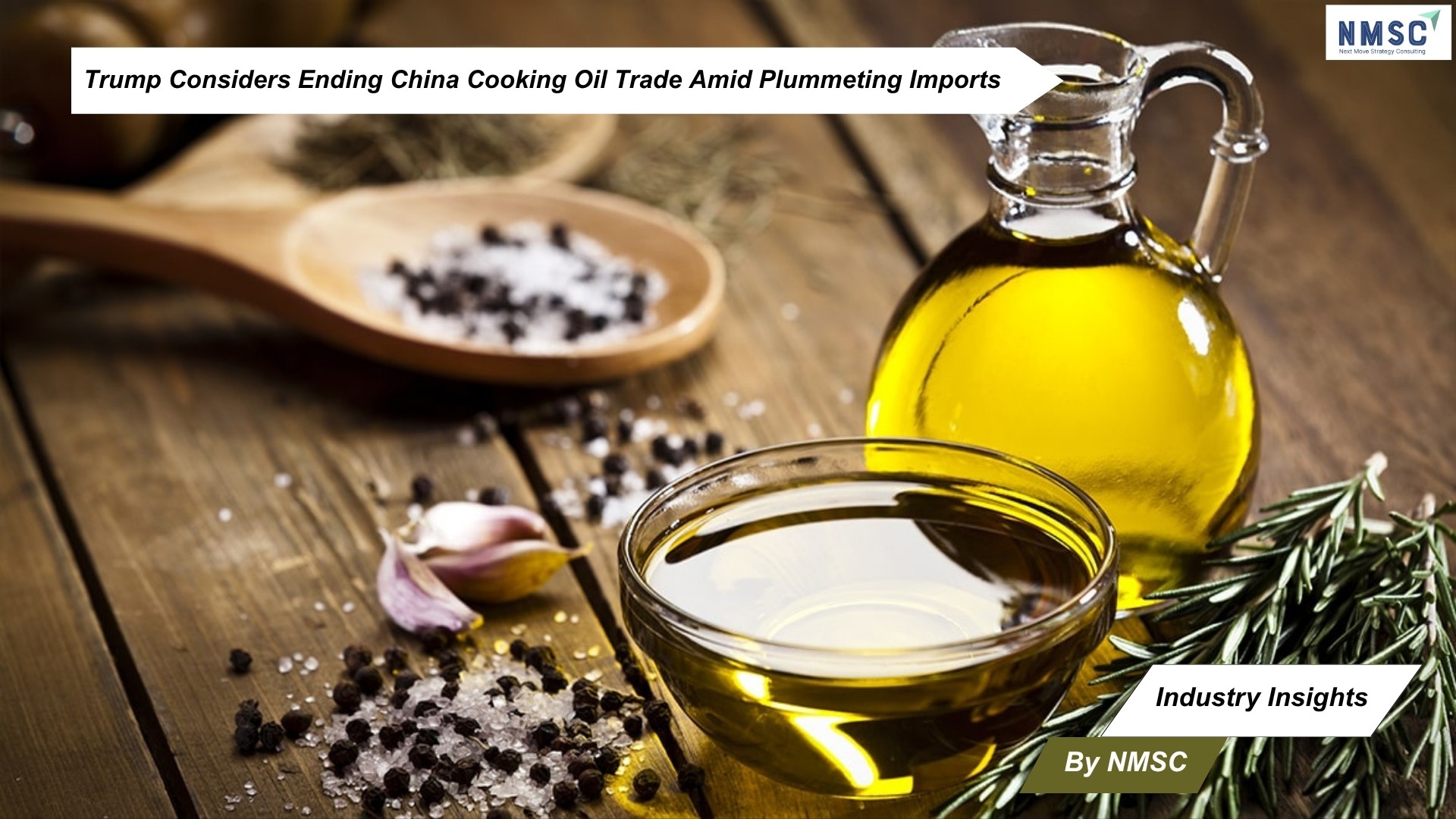Trump Considers Ending China Cooking Oil Trade Amid Plummeting Imports
Published: 2025-10-16

Industry Insights from Next Move Strategy Consulting
As tensions between the United States and China persist, President Donald Trump announced he is evaluating the termination of certain trade ties with China, specifically highlighting cooking oil. Analysts and traders, however, note that U.S. imports of Chinese cooking oil have already experienced a significant decline over the past year, suggesting that the administration’s latest statements are unlikely to materially affect market dynamics.
A Focus on U.S.-China Cooking Oil Trade
In a social media statement on Tuesday, Trump wrote, “I believe that China purposefully not buying our Soybeans, and causing difficulty for our Soybean Farmers, is an Economically Hostile Act. We are considering terminating business with China having to do with Cooking Oil, and other elements of Trade, as retribution.” He emphasized that domestic production of cooking oil is sufficient, making imports from China largely unnecessary.
The U.S. has historically been China’s top market for used cooking oil (UCO), with imports reaching a record 1.27 million metric tons valued at $1.1 billion in 2024. However, following China’s reduction of tax rebates late last year and the imposition of U.S. tariffs on Chinese goods in 2025, imports plunged sharply. From January to August 2025, shipments fell 65% to just 290,690 tons, equivalent to $286.7 million.
Two traders in China, speaking on condition of anonymity, described Trump’s latest comments as having “minimal” impact. One noted, “The U.S. pretty much stopped buying from China anyway, so the impact is as empty as his threats.” Another explained that domestic producers are now prioritizing European orders over U.S. demand, further reducing China’s exposure to the American cooking oil market.
Implications for Agricultural Trade and Farmers
While the used cooking oil trade is relatively small compared with broader commodity flows such as soybeans, the move reflects ongoing U.S. efforts to protect domestic agricultural producers. China imported 22.13 million tons of U.S. soybeans last year, valued at $12 billion, but recent months have seen a marked shift in purchases toward Brazil and Argentina.
Senior analyst Chim Lee of the Economist Intelligence Unit noted, “Used cooking oil is a niche trade, but it shows how the Trump Administration is standing up for American farmers, just as China shifts its agricultural purchases towards other suppliers.” Trump has framed these shifts as negotiation strategies, signaling that U.S. soybean trade remains a key lever in ongoing bilateral discussions with Chinese counterparts, including Xi Jinping.
Next Move Strategy Consulting’s View
Next Move Strategy Consulting emphasizes that the cooking oil market is a highly specialized and niche segment within global agricultural trade. According to their analysis, while U.S. imports of Chinese used cooking oil have declined sharply, the market remains strategically important as a barometer of trade tensions and policy signaling. “Although the commercial volume of cooking oil trade is limited compared with soybeans or corn, it provides insight into how policy decisions influence global supply chains and commodity pricing,” notes a report from Next Move Strategy Consulting. “The recent plunge in imports indicates that the U.S. market is increasingly self-reliant, sourcing cooking oil domestically and from alternative regions. China’s shift toward European buyers highlights the market’s flexibility but also underscores the sensitivity of smaller commodity segments to trade policy announcements.”
The consultancy also highlights that, from a market standpoint, any termination of cooking oil imports from China would have minimal immediate impact on U.S. supply, but it would signal a continued prioritization of domestic production and farmer protection, reinforcing broader trade negotiation strategies with China.
Broader Trade Tensions and Geopolitical Context
The cooking oil announcement is part of a cascade of U.S. tariff orders targeting billions of dollars in Chinese goods, aimed at narrowing the trade deficit, reviving domestic manufacturing, and limiting imports of products such as fentanyl. U.S.-China relations have remained strained across multiple fronts, including technology, human rights, the origins of COVID-19, and geopolitical disputes involving Hong Kong, Taiwan, and Ukraine.
In this context, the cooking oil measure is less a market intervention and more a continuation of strategic positioning. By signaling potential trade termination, the U.S. reinforces its stance in ongoing negotiations while highlighting support for American farmers and producers in sectors already facing international competition.
Redefining Agricultural Trade Signaling
As U.S.-China trade dynamics evolve, the case of cooking oil demonstrates how niche commodity markets can serve as platforms for broader geopolitical messaging. While immediate commercial disruption may be limited, the policy implications are notable, particularly in signaling U.S. priorities in agriculture and trade strategy.
Next Move Strategy Consulting concludes that, despite minimal immediate impact on the cooking oil market, the move reflects a consistent approach to leveraging trade tools to influence bilateral negotiations, maintain agricultural competitiveness, and assert economic sovereignty.
Source: Reuters
Prepared by: Next Move Strategy Consulting
About the Author
 Tania Dey is a highly experienced Content Writer and a passionate SEO Executive with a specialized focus on digital transformation, technology trends, and industry-focused insights. She has honed her expertise in creating compelling, data-driven content that not only enhances online visibility but also aligns with the ever-evolving demands of modern business landscapes. Her work spans a diverse range of industries, including technology, and digital services, enabling organizations to communicate their vision and value propositions effectively to both niches.
Tania Dey is a highly experienced Content Writer and a passionate SEO Executive with a specialized focus on digital transformation, technology trends, and industry-focused insights. She has honed her expertise in creating compelling, data-driven content that not only enhances online visibility but also aligns with the ever-evolving demands of modern business landscapes. Her work spans a diverse range of industries, including technology, and digital services, enabling organizations to communicate their vision and value propositions effectively to both niches.
About the Reviewer
 Debashree Dey is a versatile Content Writer, PR Specialist, and Assistant Manager in Digital Marketing, known for her ability to craft audience-focused narratives and develop data-driven strategies that enhance brand visibility. As a published manuscript author, she combines creativity
with strategic acumen to help brands strengthen their presence and drive deeper user engagement. Outside of her professional pursuits, Debashree draws inspiration from creative projects and design explorations.
Debashree Dey is a versatile Content Writer, PR Specialist, and Assistant Manager in Digital Marketing, known for her ability to craft audience-focused narratives and develop data-driven strategies that enhance brand visibility. As a published manuscript author, she combines creativity
with strategic acumen to help brands strengthen their presence and drive deeper user engagement. Outside of her professional pursuits, Debashree draws inspiration from creative projects and design explorations.















Add Comment